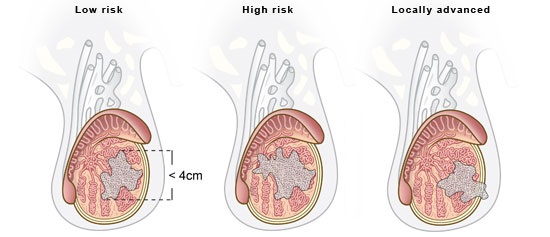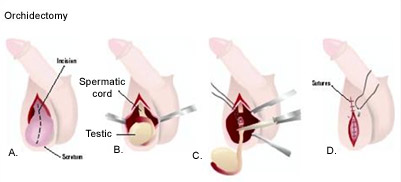 The testes or testicles are paired sex glands of the male reproductive system that produce sperm (germ cells) and hormones (mainly testosterone).
The testes or testicles are paired sex glands of the male reproductive system that produce sperm (germ cells) and hormones (mainly testosterone).
According to the general statistics of cancer, testicular cancer is diagnosed each year in about 50 thousand men, it is a rare tumor. The average age of men is about 40 years.
Risk factors
The exact causes of the disease have not been identified, but there are several factors causing cancer:
- Cryptorchidism - undescended testicle into the scrotum may cause the cancer. It can be one-sided and two-sided. In the first case, the probability of developing cancer exceeded 5 times, in the second - 10.
- Congenital diseases of the penis, testicles (testicular atrophy, varicocele, hypospadias), renal (kidney double, the doubling of the ureter). Inguinal hernia increases the risk of this cancer by 2-3 times.
- Hereditary factors: family cancer of the testicles.
- Infertility: Patients with infertility have an increased chance of developing intraductal neoplasia, which can turn into invasive cancer.
- Toxemia of pregnancy, caused by hypersecretion of estrogen or prolonged use of estrogen during pregnancy increases the risk of this disease in sons.
- Early puberty of boys.
- Lack of physical activity.
Symptoms of testicular cancer
Consider the following clinical picture:
- The appearance of new growths in the scrotum.
- Pain and feeling of heaviness in the abdomen and scrotum.
- The increase of lymph nodes size in the groin.
The basis for the 90% of testicular tumors is germ cells that produce sperm. There are two types of germ cell formation: nonseminoma (40%) and seminoma (60%).
Seminoma of testicular
The tumor has the form of dense lobular unit. Seminoma testicular divided into two groups:
- Germinal seminoma (95%) is developed in testicular epithelial tissue (embryonal carcinoma, teratoblastoma, seminoma, horionepitelioma and others).
- Non-germinal seminoma is formed from the body of the stroma (sarcoma, leydigoma, sertolioma).
This type of tumor metastasizes early that affect the lymph nodes par excellence.
Testicular non-seminoma
In most cases there nonseminoma aged 20-30 years. Types: teratoma, choriocarcinoma, yolk sac tumor, embryonal carcinoma. For this type of tumors characterized by extreme metastasis to lymph nodes and lungs.

Diagnosis of testicular cancer in Israel
The following types of inspections may be carried out for the treatment of testicular cancer in Israel:
- Inspection and palpation of the testes, lymph nodes.
- Laboratory tests: general analysis of blood and urine, blood chemistry, diagnostic of protein fractions, including tumor markers (CEA, AFP).
- Ultrasound examination of the scrotum and testicles.
- Computer tomography, magnetic resonance imaging, PET-CT. It is used to verify the results of treatment.
- Angiography.
Testicular Cancer Treatment in Israel - the main methods
On the basis of an accurate diagnosis an individual treatment program for each patient is selected. Treatment supposes to use several methods. To date, a comprehensive treatment (a combination of different types of therapy) achieves excellent results in the fight against cancer.
Surgery
The most effective method of testicular cancer treatment in Israel is considered to be surgical removal of the testicle through an incision in the groin area. After that, it should normalize tumor markers.
Types of operations in the treatment of testicular cancer in Israel
- Orchiectomy. This surgery is performed under general anesthesia. In the groin area the specialist makes an incision, carries out the inspection, than removes the egg with a neoplasm. In 5% of cases of cancer if it has defeated both testicles the specialists perform orchiectomy, retroperitoneal lymph nodes. During the operation it is possible to make implantation of artificial implants. Furthermore, if man wants to have children in the future it the specialists may suggest sperm preservation.
- Retroperitoneal lymphadenectomy - surgical intervention is carried out under general anesthesia for about 6 hours. During surgery, the surgeon makes a midline abdominal incision, and then removes the affected lymph nodes, spermatic cord, blood vessels.

Chemotherapy and hormone therapy
If there are any secondary tumors the treatment of testicular cancer in Israel successfully uses chemotherapy and radiation therapy. Chemotherapy is administered after surgery. Radiotherapy may be performed prior to surgery to reduce tumor size.
In addition, radiosurgery may be recommended if the tumor defeated one of the testes. If during the surgical treatment of testicular cancer there was removal of both testicles, specialists selected hormone therapy.
Good results in the treatment of testicular cancer in Israel shows targeted therapy, where drugs block the development of tumor formation and do not have a toxic effect.
In the treatment of testicular cancer in Israel successful recovery occurs in 92-95% of cases. In 4th stage of testicular cancer successfully is applied the method of autologous bone marrow transplantation.
Coordination Center «Isramedic» is ready to assist in the organization of high-quality and effective treatment. Questions about the prices, diagnostics, staying in the country, you can ask our experts.






